- Home
- William Kowalski
The Good Neighbor Page 27
The Good Neighbor Read online
Page 27
“Ellen,” said Francie aloud, to the water. “How could you do it to him? How could you?”
She received no answer, except the gentle trickle of the frigid water over the egglike stones, which seemed once again to be an echo of her voice, in some strange, liquid language.
“I can’t forgive you,” Francie whispered. “It’s not my place to forgive you. There’s no one left who can do that, Ellen. And even if I could, I wouldn’t. How could you do it? How could you kill that baby?”
The water was whispering explanations back to her—explana tions she could almost understand, with her poet mind. But what ever it was saying was too faint, and too old, to hear.
26
Forgiveness
In the dream, or perhaps nightmare—or perhaps it was real— Colt was sitting in a courtroom. He knew that he was dead be
cause it looked just like a courtroom on earth, except there were no walls, ceiling, or floor. All around him was an impenetrable black nothingness, as if he had ended up in some part of the uni verse where stars had not reached yet. They were floating in a void, and a void was precisely what Colt had always imagined death to be—just a big black bowl of nothing, with a helping of nothing on the side. Nothing with nothing in it.
Yet here he was, sitting at the defendant’s table. So he was wrong—there was not nothing. And there was a judge in front of him. Or, rather, there was someone, sitting up on the bench—but he couldn’t make out any features. In fact, the judge didn’t appear to have a body at all. He—or she, or it—was just an amorphous black shadow, invisible against the nothingness. Yet still he could sense its presence.
“How do you plead?” asked the shadow.
280 WILLIAM KOWALSKI
“Plead to what?” Colt said. “I didn’t do anything! This is all Flebberman’s fault!”
The shadow grunted knowingly.
“If you didn’t do anything,” it asked him, in a suspiciously fa miliar voice, “then why are you here?”
Colt felt suddenly short of breath. “I’m ready to wake up now,” he said.
There were whispers, as if the shadow was conferring with someone else.
“All righty,” it said brightly. “You can wake up. But we’ll see you back here soon, and we’ll expect an answer then.”
“Oh, no, you won’t,” said Colt. “I’m not coming back.”
“Yes, you are,” said the judge’s voice. “You’re not as slick as you think you are, you know.”
❚ ❚ ❚
When Colt awoke, he didn’t know if it was morning or night. Shades were drawn over the windows. He knew only that he had been asleep for a long time. Scant illumination came from an open doorway. He knew there was someone with him, but he couldn’t see who.
“Hello?” Colt called. He was shocked at how pathetic and weak his voice seemed. Was this the same “stockbroker ’s voice” that he’d been honing for the last twenty years? He sounded more like a Cub Scout with emphysema.
He heard soft footsteps, and a face appeared in his field of vi sion. It was a woman. A nurse, with shoulder-length gray hair, and a pink sweater on over her white uniform.
“You’re awake, finally,” she said. “Hi there, Coltrane. My name is Wanda.”
Colt struggled to speak. “Dead?” he managed to cough.
Wanda smiled. “No, you’re not dead. You’re in the hospital in Allentown, Pennsylvania. You had a car accident on the highway,
The Good Neighbor
281
and they had to bring you all the way here because you were in pretty bad shape. Do you understand?”
Colt nodded, relieved. So the courtroom was a dream. “Throat hurts,” he said.
“You had a tube in, that’s why. You were in surgery to repair your arm. You might find it hard to talk for a few hours yet.”
“Arm?”
“It’s broken in three places. They had to put some pins in, to hold everything together. Your left arm. Don’t try to move it. How do you feel?”
“Bad,” he said. “Judge?” “I’m sorry?”
He shook his head, as if to say “Never mind.” “Spine?” he said.
“Your spine? What about it?” “Paralyzed?”
“No,” said the nurse. “You’re not paralyzed. Can you feel your toes?” She reached down and tickled his bare feet. To his immense relief, Colt could. Of all the things he feared going wrong with him, paralysis was at the top of the list of fears, followed by severe burns, followed by flesh-eating disease. He wasn’t burned, and he didn’t feel as though he were being eaten. If all he had was a bro ken arm, he’d gotten off relatively light.
But what was he doing here at all?
Oh, yes. He remembered now. Flebberman. The dump. The ac cident. The police car.
“Cop?” he said, coughing again. His throat felt as if it had been scrubbed with steel wool. “Cop hurt?”
“The trooper you hit, you mean?” Colt nodded.
“He was a little banged up,” Wanda told him. “But he’s all right.
And the man who was in the truck with you is all right, too.” “Not dead?”
“No, my goodness,” said the nurse. “He’s not dead.”
282 WILLIAM KOWALSKI
“Shit,” said Colt.
Wanda appeared startled. “Maybe you shouldn’t talk about it,” she said. “Not to me, I mean. The police are waiting outside to ask you some questions. They’ve been hanging around. When you feel ready.”
“Ready,” said Colt. “Ready now.”
Wanda raised the head of the bed, which made his head swim. She held a cup of water for him, and he sipped from a straw, coughing again with the effort of swallowing—much more diffi cult than he remembered it.
“How long out?”
“You were out for about a day,” Wanda said. “You were uncon scious when they brought you in, and you started to come to, but they put you out again for surgery. It’s the day after you came in. You’ve been here just over twenty-four hours.”
“Ready,” said Colt. “Cops.”
“If you’re sure. I’ll bring them in now.”
❚ ❚ ❚
Wanda left, and a moment later two policemen entered, large, muscular men in the dark gray uniforms of the Pennsylvania State Police, with bulky pistols strapped to their sides and wide- brimmed hats resting precariously atop their heads. One had a mustache, the other was clean-shaven and baby-faced. They in troduced themselves as Witherspoon and Riller.
“You’re Coltrane Hart?” Witherspoon said. He was the one with the mustache.
Colt winced. “Too loud,” he said.
“Please keep your voices down, officers,” said the nurse. “He has a concussion. That’s why the shades are drawn. He’ll be very sen sitive to both light and noise.”
“Sorry,” said Witherspoon.
The Good Neighbor
283
After glancing from Colt to the troopers doubtfully, the nurse left. Witherspoon leaned over until his face was inches from Colt’s ear.
“You hit my car,” he said, in a stage whisper. “Sorry,” said Colt. “Flebberman, gun. Kill me.”
“Yeah, we know,” said Witherspoon, straightening up. “I just wanted to let you know that was a new car. Brand-new. I just had it waxed.”
“Come on, Ed,” said Riller.
“Really sorry. Kidnapped me,” Colt told them. He coughed. “Water?” he said hopefully.
The baby-faced Riller picked up the cup from the nightstand and held it under his chin. Colt sucked at the straw again, the wa ter soothing his ruined throat, until it was gone.
“Thanks,” said Colt. To Witherspoon he said, “Didn’t mean to hurt you.”
“But you can confirm that you hit me on purpose?” Colt nodded. “Life in danger,” he said.
“I figured. Mr. Hart, can you explain to us exactly what was go ing on there between you and Mr. Flebberman? We haven’t been able to figure it all out, and he’s not talking.�
��
“Kidnapped,” Colt said. “From my apartment. At gunpoint.” “Do you know Mr. Flebberman?”
Colt nodded.
“Was this a personal thing, then?” “Oh, yeah,” he said. “Very.”
“I see.” Witherspoon and Riller exchanged glances.
“The gun wasn’t loaded, you know,” said Riller. “Of course, there’s no way you could have known that. But there were no rounds in the cylinder.”
Colt felt a hot tide of shame rising up from his chest and into his face. Not loaded? He had been duped by an unloaded gun? “You sure?”
284 WILLIAM KOWALSKI
“Yeah, we’re sure. It’s still a crime, though. We’re just trying to determine exactly which charges to file against Mr. Flebberman,” Witherspoon said.
“All of them,” said Colt. “All of them?”
“Prison time. Death sentence. Gas chamber.”
“The law doesn’t make that provision for kidnapping, sir,” said Riller. “But he is in deep trouble. Transporting you across a state line was his biggest mistake. That’s when it went federal. The FBI will be wanting to talk to you.”
Colt’s eyes widened in delight. “Federal?” he repeated. “Good!
Big trouble.”
“Yes,” said Witherspoon. “Big trouble. What we’d also like to know about, though, is the human remains in the back of the truck. What, uh . . . what’s the story there?”
Colt felt himself growing ill again at the thought of those slimy bones. He closed his eyes until the feeling faded.
“He made me,” he said. “Pick them up. Touch them. From the dump.”
“Were you fellows out grave-robbing or something?” asked Witherspoon.
“No! Told you. Forced me. The dump!” “You got the remains from the dump?” Colt nodded.
“What were they doing there?” asked Riller.
“Mistake,” Colt said. “Not my mistake. But he blamed me.” “Someone else dumped them there?”
“Yes. Exactly.” He wanted to explain further, but his throat had begun to feel as though it was closing up on him. He shook his head. At that moment the nurse came in again and shot a worried look at the troopers.
“You boys should leave,” she said. “He needs to rest.”
“All right. We’ll have to come back to this,” said Riller, sighing. “Sorry,” said Colt.
The Good Neighbor
285
“Thanks for your cooperation, sir.”
The troopers left. Wanda the nurse gave him something for the pain, and he slept again.
❚ ❚ ❚
“Well?” inquired the shadowy judge, in that same familiar voice. “Has the defendant made up his mind?”
Colt looked around. He was dismayed to find himself back in the courtroom. Glancing down at himself, he saw that he was no longer in his hospital gown, but wearing one of his good work suits.
“Wait a goddamn minute here!” he said. “I don’t even know what I’m charged with!”
The judge sighed.
“If you really want to go through this charade, we will,” he said—it was definitely a man’s voice, at least, though nothing about him had become any more distinct; he was still just a dark shadow behind the bench. “The list of charges is quite long, though. It would take several months to read out loud.”
Colt laughed in disbelief. “Several months?” he repeated. “Come on. You’ve got the wrong guy here. I think you think I’m someone else.”
“No, you’re the right man, Mr. Hart. We know all about you.” “In that case,” said Colt, “I want a lawyer.”
“You have a lawyer,” said the judge. “He’s standing right next to you.”
Colt looked to his right. There, also wearing a suit, his hair neatly slicked back, was Joe.
“Hiya, Coltie,” said Joe. “How’s tricks?” “Joe?” he said, incredulous.
“That’s my name,” said Joe. “Don’t wear it out.”
“Joe, you’re not a lawyer!” Colt said. “Come on! This is ridicu lous!”
286 WILLIAM KOWALSKI
“I wasn’t a lawyer on Earth, but I am here,” Joe said. “We all have different jobs.” He leaned in to whisper confidentially. “We really don’t have time to get into everything,” he said. “Not now. Just go with it. I’ll explain later.”
Colt began to panic.
“What about a jury?” he asked. He was just stalling for time, and he could tell the judge knew it—but Joe pointed off to his right.
“There,” he said.
In the jury box that had suddenly materialized, Colt saw twelve people—seven adults in varying stages of middle age, all wearing nineteenth-century costumes, and five children, some of them infants.
“Now, wait just a frigging minute!” Colt said. “What kind of se lection process do you people go through here? This is insane! You can’t have babies on a jury!”
“The laws here are a little different,” the judge said. “You’ll fig ure them out eventually.”
“He is so guilty,” said one of the babies.
“Damn straight he is!” said one of the men, who had an iron- gray handlebar mustache. “String him up!”
“Patience, Captain Musgrove,” said the judge.
“Patience my ass,” snorted the Captain. “I changed my mind. I want to testify. I don’t want to be on the jury anymore.”
“Everyone will have their turn,” the judge said. “I promise.” “Now hold on!” said Colt. “He can’t be a jury member and a
witness! That’s not fair, even if I did dig him up!”
“So you admit it?” the judge said, pouncing. “Ha! Let the record show that—”
“Ah, hold on just a second there, Your Honor,” said Joe. “Strictly speaking, he didn’t dig up the Captain. The Captain is buried in Gettysburg.”
“Next to a damned Rebel, yet!” the Captain roared. “The indig nity of it!” He turned and glared at the woman next to him, but
The Good Neighbor
287
she ignored him, looking calmly ahead, saying nothing. The other jury members tittered to themselves at this outburst. Disapproval radiated from the direction of the bench.
“What—wait a—I don’t admit anything!” said Colt. “I want to wake up again, right now!”
The judge sighed. There was the sound of voices conferring again, and then a hammer banging, though no hammer was in sight.
“So ordered,” he said. “But you’re running out of chances here, Coltrane. You’re going to have to go through with this sooner or later, you know.”
❚ ❚ ❚
When Colt awoke again in the hospital room, still with no idea what time of day it was, he could sense that again there was someone else in there with him. He squinted into the gloom and recognized a familiar shape.
“Francie?” he asked.
“Hello, Colt,” said Francie, getting up from the chair by his bed side, where she’d been curled up, waiting. At first, Colt could barely make out her features. Then details swam into focus, and he saw in the dim light that she was wearing a flannel shirt and jeans, her hair pulled back into a ponytail. Her expression chilled him; she seemed as detached as if she was at a stranger ’s funeral. “Thought I’d stop by to see how you were doing. The police called me to let me know. I—I’m sorry this happened to you. I knew Randy was mad at you, but I didn’t know he was this mad.”
“God, I’ve been having the most terrible dreams. What time is it?”
She looked at the clock on the nightstand. “It’s one A.M.,” she said.
“I’m losing track of time,” he said. “I have a concussion.” “That’s what they said.”
“How—how did you get here? Michael drive you?”
288 WILLIAM KOWALSKI
“I drove myself,” she said. “In my new pickup truck. Michael’s in Denver. Or somewhere. I don’t know where he is, actually. I threw him out.”
“You bought a pickup truck?” he asked.
A light went on in Colt’s head. “Did you buy it from Flebber man?”
“Yes.”
“So that’s how he found out where our apartment is. He said you’d written him a check.” Colt glared at her. “He kidnapped me,” he said. “Did you know that? That son of a bitch snuck into the apartment and pointed a gun at me. And he hit me with it! In the face!”
“He was pretty upset, last I saw him,” Francie said. “But the po lice said the gun wasn’t loaded.”
“As if that mattered! Did you know what he was planning to do to me?”
“Of course not!” said Francie. “I knew he was going to do some thing, but I didn’t think it would go that far.”
“I bet you hoped it would,” Colt said bitterly. “I bet you wish he’d killed me.”
“Colt, please,” said Francie. “That’s not true.” “Huh.”
“Look. It’s late, and I want to go home and go to bed. I just wanted to see how your arm was. They said it was pretty bad. I guess they were understating it a little.”

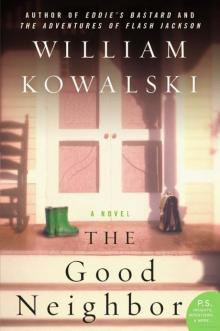 The Good Neighbor
The Good Neighbor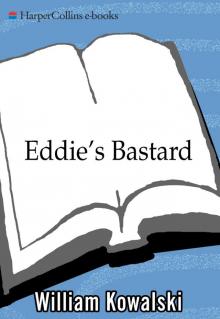 Eddie's Bastard
Eddie's Bastard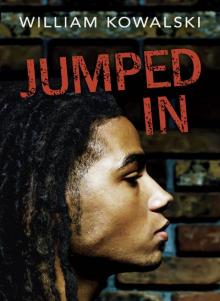 Jumped In
Jumped In Something Noble
Something Noble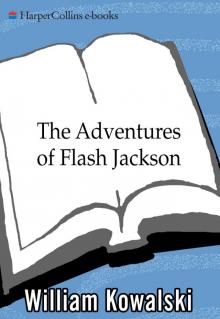 The Adventures of Flash Jackson
The Adventures of Flash Jackson Just Gone
Just Gone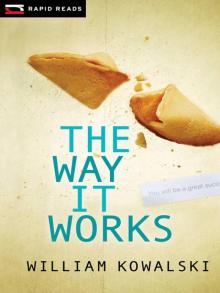 The Way It Works
The Way It Works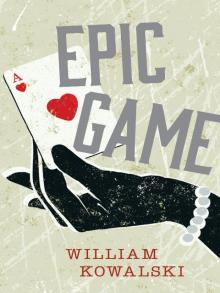 Epic Game
Epic Game